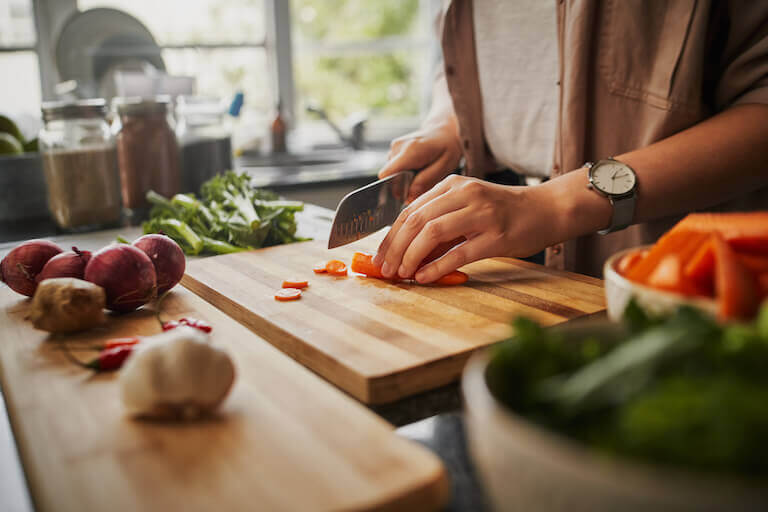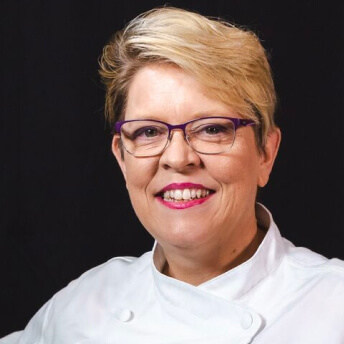Listen to This Article:
Have you ever been kneading dough and the repetition became a kind of meditation? Or you were making Nonna’s red sauce on a Saturday morning after a tough week, and the simmering sauce and familiar smells wrapped you in a sense of comfort.
Prepping and cooking food can be much more than a means to an end. This comes as no surprise to those who study cooking therapy, as cooking can help relieve a variety of stresses in our lives.
What Is Cooking Therapy?
The concept of “Food as Medicine” has been around for ages. More recently, food as therapy has emerged as an added (and sometimes complementary) element; Michael Kocet is largely credited with developing the first course on the subject for The Chicago School of Professional Psychology in 2014.
Cooking therapy, sometimes called culinary therapy or cooking mindfully, is a type of activity-driven therapy like art therapy, equine therapy, dance therapy, and more.
“Like other tangible therapies, (Art, Music, Equine) Cooking Therapy is an active, focused process using individualized recipes to address specific issues,” LCSW Debra Borden explains on her website.
What Does it Mean to Cook Mindfully?
Like most therapy, culinary therapy is focused on helping people become more mindful and aware. In this case, the act of preparing food serves as the vehicle for exploration and reflection. Some people may also gain benefits from eating home-cooked foods, which can be healthier and less processed than others.
Things to consider while cooking mindfully:
- Keeping a cooking journal to write down thoughts and memories about food.
- Practicing mise en place. The act of getting organized can add a feeling of control and calm as well as confidence.
- Focus intently on the task at hand. If chopping, for example, pay attention to the textures and smells as well as your mood and any thoughts that come up. Some of our behaviors outside of the kitchen may arise within it, Borden points out; these can include impatience or anxiety, for instance.
- Reflect. As you cook, the conversation will connect threads from your kitchen activity to other areas of your life.
Mindfulness Is a Key Element
Cooking therapy can be used in different ways, but one consistent theme is mindfulness. Mindfulness is the practice of remaining present in the moment and not judging the thoughts and emotions you’re experiencing.
Rather than rushing through the process like you might when making dinner on a busy weeknight, you take your time during each step. That includes thinking through the ingredients and tools you’re setting out during your mise en place as well as considering the recipe you’re making and what that food might mean to you.
As you prep and cook, you might talk through what the motions of preparing and what the food itself are bringing up for you. And in the kitchen, there’s the unique element of the aromas, which can be powerful.
“The direct contact between the nose and brain can trigger an emotion,” Rebecca Bruck, licensed clinical social worker, explains on her website. “The scent of orange peels for example can make you happy, cheerful, and feeling energetic. Even if those feelings last a few minutes, the very act of peeling a simple orange can help you learn to cultivate mindfulness.”
Other Benefits
Mindfulness and being present are the benefits that are most often discussed, but there’s more.
Help With Focus
Similar to mindfulness, cooking therapy can help with focus. Again, rather than rushing through a task, cooking therapy helps you slow down and take your time in the kitchen. There’s no multi-tasking here; you won’t be answering emails on your phone while waiting for the sauce to simmer.
Instead, you might be thinking about where you got the recipe, what you remember about sauce as a child, and what memories the aroma brings up.
Reduce Anxiety
Culinary therapy can help reduce anxiety by forcing you to focus on the moment at hand and training your mind on the present moment. It may reduce the repetition and ruminating that anxiety can bring on.
When you are fully focused on the recipe at hand, your brain is not catastrophizing or running off into the what-if’s that might create anxiety for you. The ability to corral your thoughts and emotions might be a technique that translates into times outside of the kitchen, or it might become a regular practice you adopt, similar to exercise or meditation.
The Power of Touch
Between the tactile sensation and the repetitive movements, the acts of chopping, rinsing, and kneading might promote relaxation, reduce stress, help lower blood pressure, and improve your breathing. You might also explore the connection between how something feels and what emotions it evokes.

Repetitive movements in the kitchen like chopping can be meditative and calming.
Mood
We have a lot of information about the effect of food on mood. Research shows that about 95% of serotonin in the body is produced in your gastrointestinal tract, which means your digestive system can affect your mental health. So culinary therapy may be able to help you discover foods that can play a role in shaping your mood and behavior.
As Part of an OT Regimen
A variety of fine and gross motor skills are necessary in the kitchen, which makes culinary therapy a potential tool to use as part of an occupational therapy regimen.
One review of studies found that cooking therapy fit into a broader approach to occupational therapy and could potentially increase participation.
Can You Practice Cooking Mindfully at Home?
You can adopt many elements of cooking therapy in your everyday life as part of a self-care regimen. Consider taking the time to really focus on your ingredients and the steps involved next time you cook. Rather than rushing through to get to the end result, think about why you’re making the meal you’ve chosen.
You can incorporate the elements of mindfulness discussed above and take a moment to think about what stimuli each of your senses is receiving. You can enjoy the tactile aspects, and journal as you go.
Find Out More About Wellness
Many people who spend time in a kitchen can attest to its meditative properties and the grounding effect that preparing and cooking a meal can provide.
You might explore more of this by pursuing an education to become a personal chef or wellness coach who works every day to help others find foods that make them feel good both physically and mentally. Or check out our Holistic Nutrition & Wellness program to explore the mind-body connection of food.
Contact us today for more information!


